Politics
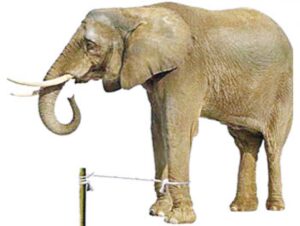
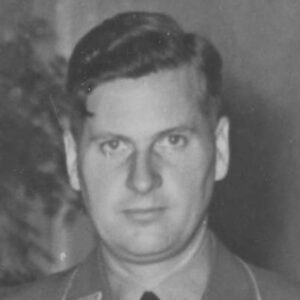 I read a story about training an elephant yesterday. It went like this, “As a man was passing the elephants, he suddenly stopped, confused by the fact that these huge creatures were being held by only a small rope tied to their front leg. No chains, no cages. It was obvious that the elephants could, at anytime, break away from their bonds but for some reason, they did not.
I read a story about training an elephant yesterday. It went like this, “As a man was passing the elephants, he suddenly stopped, confused by the fact that these huge creatures were being held by only a small rope tied to their front leg. No chains, no cages. It was obvious that the elephants could, at anytime, break away from their bonds but for some reason, they did not.
He saw a trainer nearby and asked why these animals just stood there and made no attempt to get away. ‘Well,’ trainer said, ‘when they are very young and much smaller we use the same size rope to tie them and, at that age, it’s enough to hold them. As they grow up, they are conditioned to believe they cannot break away. They believe the rope can still hold them, so they never try to break free.’
The man was amazed. These animals could at any time break free from their bonds, but because they believed they couldn’t, they were stuck right where they were.”
The story made me think about the way Hitler was able to train a generation to follow him without question. He took the children away from their parents when they were young, basically telling the parents that the state knew what was best for the children, and the parents didn’t know enough about educating the children to do a good job. He set up the Hitler Youth organization in 1933 for educating and training male youth in principles. Of course, the principles Hitler had in mind were vastly different from any that the parents could imagine. Hitler’s ideas included racism, killing any “undesirables” among the population, and controlling the people with curfews and lockdowns…to name a few. Under the leadership of Baldur Benedikt von Schirach, the head of all German youth programs, the Hitler Youth included by 1935 almost 60 percent of German boys. On July 1, 1936, it became a state agency that all young “Aryan” Germans were expected to join. Upon reaching his 10th birthday, a German boy was registered and investigated especially for “racial purity” and, if qualified, inducted into the “German Young People.” At age 13 the youth became eligible for the Hitler Youth, from which he was graduated at age 18. Throughout these years he lived a life of dedication, fellowship, and Nazi conformity, generally with minimum parental guidance. From age 18 he was a member of and served in the state labor service and the armed forces until at least the age of 21.
Two leagues also existed for girls. The League of German Girls trained girls ages 14 to 18 for comradeship, domestic duties, and motherhood. “Young Girls” was an organization for girls ages 10 to 14. The girls were expected to have babies to build the Reich…provided they qualified as “racially pure,” of course.
In the tumultuous days we currently live in, parents need to be very involved in what our children are being taught. The current racially charged climate in our nation would only be exacerbated by teaching our children things like Critical Race Theory, because it is really the new Ku Klux Klan. Racism, against any nationality is simply wrong…there is no gray area. Our children need to be able to be proud of the race they are and the background they come from. Racism is unacceptable, against any race, and we, as parents, grandparents, and 
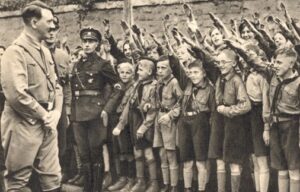 even great grandparents, need to kick the government out of our educational system, and get back to decent moral values. We need to stop the insanity in our schools, and teach our kids the true history of our nation. We must teach good values, and our children need to be taught to accept all races. We need to start with the kids, because they are the future leaders.
even great grandparents, need to kick the government out of our educational system, and get back to decent moral values. We need to stop the insanity in our schools, and teach our kids the true history of our nation. We must teach good values, and our children need to be taught to accept all races. We need to start with the kids, because they are the future leaders.
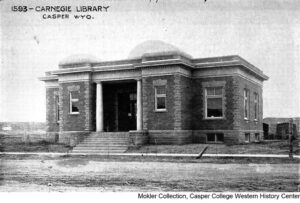 Andrew Carnegie is a name most people have heard of, at least when you think of places like Carnegie Hall, but that isn’t something that has much in common with places like Wyoming…or does it? Andrew Carnegie was born to Margaret Morrison Carnegie and William Carnegie in Dunfermline, Scotland. The family lived in a typical weaver’s cottage with only one main room, consisting of half the ground floor, which was shared with the neighboring weaver’s family. It was here in very humble beginnings that Andrew Carnegie made his debut. When Carnegie was 12, his father had fallen on very hard times as a handloom weaver. To add to the family’s predicament, the country was in starvation. His mother helped support the family by assisting her brother and by selling potted meats at her “sweetie shop,” making her the primary income in the family. The family was struggling to make ends meet and they knew they weren’t going to make it…at least not in Scotland. The Carnegies then decided to borrow money from George Lauder, Sr and move to Allegheny, Pennsylvania, in the United States in 1848 for the prospect of a better life. In September 1848, Carnegie arrived with his family in Allegheny. That was not the end of their struggles, however. Carnegie’s father struggled to sell his product on his own, but eventually father and son both received job offers at the same Scottish-owned cotton mill, Anchor Cotton Mills. At least they had some income, meager as it was.
Andrew Carnegie is a name most people have heard of, at least when you think of places like Carnegie Hall, but that isn’t something that has much in common with places like Wyoming…or does it? Andrew Carnegie was born to Margaret Morrison Carnegie and William Carnegie in Dunfermline, Scotland. The family lived in a typical weaver’s cottage with only one main room, consisting of half the ground floor, which was shared with the neighboring weaver’s family. It was here in very humble beginnings that Andrew Carnegie made his debut. When Carnegie was 12, his father had fallen on very hard times as a handloom weaver. To add to the family’s predicament, the country was in starvation. His mother helped support the family by assisting her brother and by selling potted meats at her “sweetie shop,” making her the primary income in the family. The family was struggling to make ends meet and they knew they weren’t going to make it…at least not in Scotland. The Carnegies then decided to borrow money from George Lauder, Sr and move to Allegheny, Pennsylvania, in the United States in 1848 for the prospect of a better life. In September 1848, Carnegie arrived with his family in Allegheny. That was not the end of their struggles, however. Carnegie’s father struggled to sell his product on his own, but eventually father and son both received job offers at the same Scottish-owned cotton mill, Anchor Cotton Mills. At least they had some income, meager as it was.
Young Andrew Carnegie was destined for better things, however. In his adult life, Andrew Carnegie enjoyed success in businesses ranging from oil to railroads to steel, Carnegie became one of the wealthiest Americans of his era. After selling off his businesses and retiring in the early part of the 20th-century, Carnegie spent the remainder of his life giving away much of his enormous wealth. It was this portion of Carnegie’s life that would forever tie him to Casper, Wyoming, and to many other towns across the country. Casper’s connection to one of America’s most generous philanthropists can be found right on the corner of Durbin and Second Street downtown…the Natrona County Public Library.
In an incredible display of generosity, Andrew Carnegie’s library foundation helped build over 1,700 public libraries around the country. As word got out, in 1905, Casper mayor Wilson Kimball wrote to the Carnegie Foundation hoping to secure a grant to start a library in his dusty, rapidly growing town. His letter read, in part, “We have a town here of at the present time about 1,500 population and there is probably not a more cosmopolitan town, of its size, in the United States. A Carnegie Library here would benefit a class that are seldom benefited by such institutions, and would afford a quiet, wholesome and instructive resort of character that are too scarce in these western range towns.” The Carnegie Foundation agreed to gift Casper, Wyoming a $10,000 grant. Land for the library was donated to the cause. The small, yet elegant design for the building ended up coming in over budget. The Carnegie Foundation was a bit frustrated, but with a few concessions from Casper, the foundation agreed to another $3,000 to help finish the project. By 1910 at the edge of town, Casper’s library was completed. The building with its classical design, high quality masonry and three domes stood out in the town. Casper was basically still a prairie, with muddy streets and stick buildings in 1910.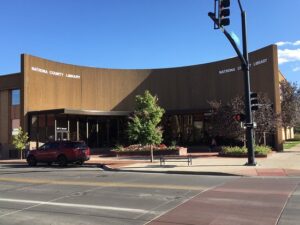
Before long, the library was obviously to small, and in the early 1920s a new design was seamlessly integrated into the original building, adding much needed space for events and collections. After the World Wars, Casper began to grow rapidly, and a prosperous Casper, added a modern addition which opened in 1952. By the late 1960s, the original sections of the Carnegie building had become obsolete and fallen into disrepair. A good portion of the old building had been relegated to storage. Sadly, in 1970, the original building was demolished and the final addition we have today was built. It was the end of the visible Carnegie connection to Casper. In all, Wyoming built a total of 16 Carnegie libraries. Ten remain.

 Recently, I ran across an article about drug use in among the Nazi regime. The article really caught my attention, because in many ways drug use among the Nazis made sense. The things they did to people would have been much easier if they were under the influence of drugs…mostly because they would be less likely to remember what they had done, and if they remembered, they would be less likely to care about what they had done. Drugs tend to dull the senses, and in many cases that makes the person relaxed and calm, but there are some drugs that make the person violent too. The article started out saying, “‘You can learn a lot about a culture from its drug use.’ Robert McAlmon, an American author living in Berlin during the tumultuous Weimar years, marveled that ‘dope, mostly cocaine, was to be had in profusion’ at ‘dreary night clubs’ where ‘poverty-stricken boys and girls of good German families sold it, and took it.’”
Recently, I ran across an article about drug use in among the Nazi regime. The article really caught my attention, because in many ways drug use among the Nazis made sense. The things they did to people would have been much easier if they were under the influence of drugs…mostly because they would be less likely to remember what they had done, and if they remembered, they would be less likely to care about what they had done. Drugs tend to dull the senses, and in many cases that makes the person relaxed and calm, but there are some drugs that make the person violent too. The article started out saying, “‘You can learn a lot about a culture from its drug use.’ Robert McAlmon, an American author living in Berlin during the tumultuous Weimar years, marveled that ‘dope, mostly cocaine, was to be had in profusion’ at ‘dreary night clubs’ where ‘poverty-stricken boys and girls of good German families sold it, and took it.’”
Over the years, a number of drugs have been banned, due to the danger of their use, the reactions of those taking them, or just that they are now deemed illegal. Cocaine was banned in 1924, but that has not really stopped it’s use. Like most drugs, if there is a “market” for it, someone will find a way to get the drug to the “customer.” Meth has become so easy to make and uses common (but poisonous) ingredients, so it has become the drug of choice for many drug addicts today. Some prescription drugs are addictive, and have become a part of the drug trafficking world too. Drugs like Opioids and Morphine are fairly easy to obtain from a doctor, because they hare used for many injuries and common ailments. Then they become addicted, and when they can no longer get a prescription for those drugs, they move on to illegal drugs.
Strangely, when the Nazis rose to power, illegal drug consumption actually fell. The Nazis regarded drugs as “toxic” to the German body. Drug users were given prison sentences, and addicts were classed…along with Jews, gypsies and homosexuals…as undesirable social elements. By the end of the 1930s, the Nazi pharmaceutical companies had turned away from opioids and cocaine, and moved towards synthetic stimulants. These could be produced entirely within Germany, per Nazi directive, of course. More money in the pocket of Hitler’s regime. “The transition from cabaret cocaine to over-the-counter meth helped fuel what German journalist Norman Ohler in his new book Blitzed: Drugs in the Third Reich calls the ‘developing performance society’ of the early Nazi era, and primed Germany for the war to come.”
I’m sure that the Third Reich, while calling it “developing performance society,” knew that the the use of these drugs was going to make the people taking the drugs more compliant to the government. Once a person is addicted to a drug, many will do anything to get a “fix,” including theft, robbery, breaking and entering, selling themselves, and even begging to get more. In 1937, the German pharmaceutical company called Temmler-Werke introduced Pervitin, which was a methamphetamine-based stimulant. The formula was developed by Dr Fritz Hauschild. He went on to pioneer East Germany’s sports doping program. Within a few months, this variant of crystal meth was available without a prescription, and was even sold in boxed chocolates. It was also widely adopted by people from all walks of life to elevate mood, control weight gain, and increase productivity. Pervitin’s success as an over-the-counter “wonder drug” caused a rebound in the country’s economic status after the war. The country came out of an economic depression to nearly full employment. Marketing for Pervitin claimed it would help “integrate shirkers, malingerers, defeatists, and whiners” into the rapidly expanding workforce. Students took it to cram for exams, while housewives took it to stave off depression. Pervitin use was so common that it became a normal part of life in the early Third Reich. For the military personnel of Hitler’s army, the chemical was a great weapon to fight the so-called “war on exhaustion.” The troops started relying on the “tank chocolate” to keep them alert for days on end. Before long, Nazi medical 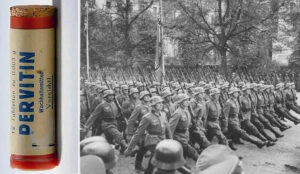 officials became increasingly aware of Pervitin’s risk factor. The tests performed on soldiers found that critical thinking skills declined the longer they stayed awake, even if the short-term gains were appealing enough. Even after drug sales to the general public were restricted in April 1940, the German Army High Command issued the so-called “stimulant decree,” ordering Temmler to produce 35 million tablets for military use. Of course, we know now that methamphetamine use is not only dangerous, but often deadly. The addictive effects alone can ruin lives. I don’t suppose Hitler cared much about that, as long as his troops obeyed his commands. I wonder how many men lost their lives because of the drug.
officials became increasingly aware of Pervitin’s risk factor. The tests performed on soldiers found that critical thinking skills declined the longer they stayed awake, even if the short-term gains were appealing enough. Even after drug sales to the general public were restricted in April 1940, the German Army High Command issued the so-called “stimulant decree,” ordering Temmler to produce 35 million tablets for military use. Of course, we know now that methamphetamine use is not only dangerous, but often deadly. The addictive effects alone can ruin lives. I don’t suppose Hitler cared much about that, as long as his troops obeyed his commands. I wonder how many men lost their lives because of the drug.
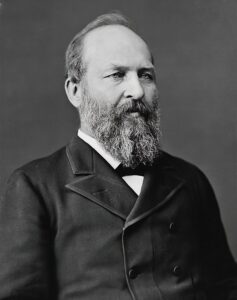 In the history of the United States, 4 presidents have been assassinated. Of course the ones we remember the most are Abraham Lincoln and John F Kennedy. The other two were William McKinley and James Garfield. With Lincoln and Kennedy, death was quick, even though with Lincoln it took until the next day. With McKinley, death came 7 days after he was shot, but with Garfield, death needn’t have come at all.
In the history of the United States, 4 presidents have been assassinated. Of course the ones we remember the most are Abraham Lincoln and John F Kennedy. The other two were William McKinley and James Garfield. With Lincoln and Kennedy, death was quick, even though with Lincoln it took until the next day. With McKinley, death came 7 days after he was shot, but with Garfield, death needn’t have come at all.
President James A Garfield had served as the president for just four months when he was shot on July 2, 1881, by Charles Guiteau in Washington DC. Guiteau had been stalking the president for about a month, and he shot him in the arm and the back. Guiteau wasn’t much of a shot I guess. Garfield didn’t die instantly, and in fact he didn’t die for 11 weeks. In the end, it wasn’t the wounds that caused his death, but rather that the wounds became infected which claimed the president’s life in the end. Had the doctors of that age known more about infection, I believe Garfield might have lived. Infection always comes from exposure to a bacteria or virus. Yes, it could have been introduced by the bullets, but with the proper treatment, the infection could also have been thwarted. Of course, I don’t know if President Garfield would have been able to walk, or move in any other way, because I don’t know how bad the wound in his back was. Nevertheless, a would that took 11 weeks to kill the man, could not have been an infection that could not be healed. Of course, I’m no 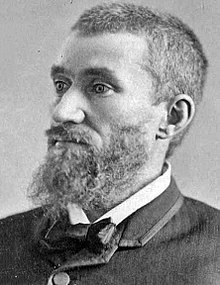 doctor, but then modern medicine has many more tools in it’s belt now than it did then. Ironically, when you think about it Garfield was not the only one of the assassinated presidents who faced exposure and lost. The others were exposed to their assassins bullet, a sad but true fact. It’s just that Garfield suffered a much longer length of time than the others…and that is truly awful.
doctor, but then modern medicine has many more tools in it’s belt now than it did then. Ironically, when you think about it Garfield was not the only one of the assassinated presidents who faced exposure and lost. The others were exposed to their assassins bullet, a sad but true fact. It’s just that Garfield suffered a much longer length of time than the others…and that is truly awful.
Apparently, Guiteau was angry because the president didn’t appoint him to the office he desired. That is an insane reason to kill a man, and Guiteau must have been a man who could not control his own emotions…sadly. While the assassinations of Lincoln, Kennedy, and McKinley are still steeped in conspiracy theories and political ideology, Guiteau’s motivations were simple…egomania, delusions of grandeur, and the belief that God had willed him to “remove” Garfield from office. Guiteau failed to become the “great man” he was striving to be, and after being convicted of murder, Guiteau was sentenced to death and was hanged in 1882.

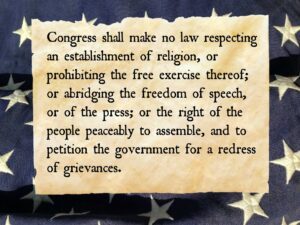 On this day, in 1787…the first Constitution Day, The Constitution of the Unites States of America was signed. It was a very important, and almost sacred day in our nations history. In fact, I believe that our nation was founded on Judeo-Christian values, and therefore our Constitution is a sacred document. The Constitution, which begins with “We the People of the United States, in Order to form a more perfect Union, establish Justice, insure domestic Tranquility, provide for the common defense, promote the general Welfare, and secure the Blessings of Liberty to ourselves and our Posterity, do ordain and establish this Constitution for the United States of America,” specifically “secures Liberty.” So many people these days don’t understand what it means to secure liberty, but the word is defined as “the state of being free within society from oppressive restrictions imposed by authority on one’s way of life, behavior, or political views.” When I read that definition, I am reminded of so many rules, regulations, and mandates we are currently living under, and I realize that as our current congress works very hard to tear down our Constitution, our nation is in danger of losing the Liberty we love so dearly.
On this day, in 1787…the first Constitution Day, The Constitution of the Unites States of America was signed. It was a very important, and almost sacred day in our nations history. In fact, I believe that our nation was founded on Judeo-Christian values, and therefore our Constitution is a sacred document. The Constitution, which begins with “We the People of the United States, in Order to form a more perfect Union, establish Justice, insure domestic Tranquility, provide for the common defense, promote the general Welfare, and secure the Blessings of Liberty to ourselves and our Posterity, do ordain and establish this Constitution for the United States of America,” specifically “secures Liberty.” So many people these days don’t understand what it means to secure liberty, but the word is defined as “the state of being free within society from oppressive restrictions imposed by authority on one’s way of life, behavior, or political views.” When I read that definition, I am reminded of so many rules, regulations, and mandates we are currently living under, and I realize that as our current congress works very hard to tear down our Constitution, our nation is in danger of losing the Liberty we love so dearly.
I don’t know about you, but I don’t like having someone tell me that I can’t attend church, because it is necessary to close down the churches. When the Covid-19 Pandemic started, the churches suddenly became non-essential, and that is criminal as per the First Amendment of our Constitution, “Congress shall make no law respecting an establishment of religion, or prohibiting the free exercise thereof; or abridging the freedom of speech, or of the press; or the right of the people peaceably to assemble, and to petition the Government for a redress of grievances.” The closing of our churches (my church thankfully refused to comply, and we were one of the few churches that never shut down) was a criminal act imposed on the people of the United States by our own government, and most churches and people allowed it. I read somewhere that “If you allow the government to break the law because of an emergency, they will always create an emergency to break the law.” That is a true statement and really should be a scary statement. The old saying, “if you give them an inch, they will take a mile” comes to mind, when I think of our government.
The reality is that Covid-19, while a serious virus, is usually survivable, and we have lived through many other “serious” viruses without lockdowns or mask mandates. People need to be allowed to make their own choices. For those who want to wear a mask, it should be accepted by everyone around that person. I would further say that if a person has chosen to wear a mask, the common sense rule that should follow is…keep your distance from them, as a courtesy. If a person doesn’t choose to wear a mask, then we have to accept their right to make their own choices concerning their own health. On thing that has seriously confused me concerning the mask mandates is that children under two and those with medical reasons that make it hard for them to wear a mask, are exempt. Now I get that a person who has difficulty breathing with a mask should be able to say “no” to the mask, but when I see a masked parent with an unmasked child, I see a recipe for a case of Covid in the child. Now I could be wrong, but doesn’t that child breathe the same air as their parent does. Sorry folks, that one makes no sense to me. If the parent is concerned for their own health and therefore wears a mask, they should be just as concerned for their child’s health and either mask the child, or put them in a protective bubble or maybe like the little wagons people pull behind their bicycles. At least that way they are attempting to protect the child from the virus they are so very afraid of.
Whew!! I have a feeling that I am going to hear it on this blog, but before you go after my views, I would recommend that you take a few minutes to give some serious thought to what I am saying here. We have become so afraid of a “bug” that we are no longer thinking rationally. Our businesses are closing down…permanently, because they can’t have customers inside, and yet they are supposed to pay rent and taxes. Our children missed between two months and a year of school, and even with online classes they are clearly behind where they should be at this point in their schooling. Landlords are going under, because while their tenants are exempt from paying rent and cannot be evicted, the mortgage payment is still due. And the one that started it all in my rant, churches have been closed down for as long as a year, some never to re-open again.
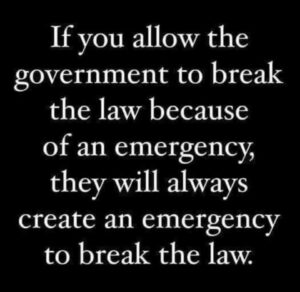
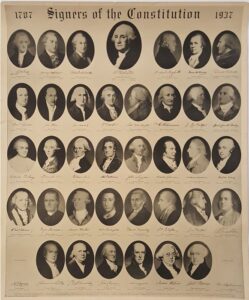
We are a relatively healthy nation of relatively smart people, who have been taking care of ourselves successfully for most of our adult lives, so why is it that suddenly, we are incapable of making the decisions necessary to continue to live healthy lives? We have to stop allowing our government to rule over us like dictators…stealing our liberty. We have to wake up!! And I don’t mean “woke” up!! We have to take a stand for America and for the world. On this Constitution Day, I invite you to take a look at the document our forefathers wrote, and see what it really says for yourself. You will be amazed.
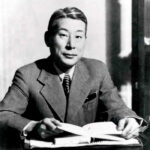 When we thing of people who were heroes for the Jewish people during World War II, we seldom think of true enemies of the Allied Nations. Still, there are people in all nations, no matter how evil the nation, who are good. One such man was Chiune Sugihara, a Japanese diplomat who served as vice-consul for the Japanese Empire in Kaunas, Lithuania. Sugihara was born on January 1, 1900 in Mino, Gifu prefecture, to a middle-class father, Yoshimi Sugihara and an upper-middle class mother, Yatsu Sugihara.
When we thing of people who were heroes for the Jewish people during World War II, we seldom think of true enemies of the Allied Nations. Still, there are people in all nations, no matter how evil the nation, who are good. One such man was Chiune Sugihara, a Japanese diplomat who served as vice-consul for the Japanese Empire in Kaunas, Lithuania. Sugihara was born on January 1, 1900 in Mino, Gifu prefecture, to a middle-class father, Yoshimi Sugihara and an upper-middle class mother, Yatsu Sugihara.
Sugihara became the vice-consul in 1939. His duties included reporting on Soviet and German troop movements, and to find out if Germany planned an attack on the Soviets and, if so, to report the details of this attack to his superiors in Berlin and Tokyo. As vice-consul, I’m sure he never expected to go against the orders of his superiors. I’m sure that he thought, as most of us do, that our country is the best one, and that our government is honorable and basically good…until we don’t. During the second world war, Sugihara made the decision…against orders from superiors…to help 6,000 Jews escape Europe by issuing transit visas to them, so that they could travel through Japanese territory. By doing this, he was risking his job and the lives of his family, but he knew that the things that were happening to the Jews were wrong, and he could not stand by and be a party to their deaths. The Jews that Sugihara helped were refugees from German-occupied Western Poland and Soviet-occupied Eastern Poland, as well as residents of Lithuania. I’m sure that Sugihara’s superiors didn’t want to anger their ally, Adolf Hitler, so they had told Sugihara to turn a blind eye to the fate of the Jewish people, and let the Nazis do what they wanted to do to them. But, Sugihara had a conscience, and he could not allow he Jews to be murdered in such a horrific fashion. He had to help as many as he could.
From July 18 to August 28, 1940, Sugihara being aware that Jewish visa applicants were in danger if they 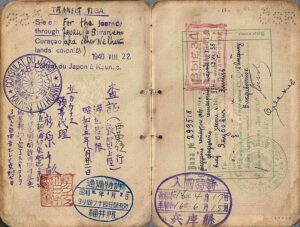 stayed behind, Sugihara decided to ignore his orders and issued ten-day visas to Jews for transit through Japan. Given his inferior post and the culture of the Japanese Foreign Service bureaucracy, this was an unusual act of disobedience. Sugihara spoke to Soviet officials who agreed to let the Jews travel through the country via the Trans-Siberian Railway…at five times the standard ticket price, of course. I guess there is no price too high…seriously. Sugihara continued to spend 18 to 20 hours a day writing hand-write visas, reportedly producing a normal month’s worth of visas each day, until September 4th, when he had to leave his post before the consulate was closed. While his time was cut short at that consulate, he had granted thousands of visas to Jews, many of whom were heads of households, thus permitting them to take their families with them. It is said that before he left, he handed the official consulate stamp to a refugee so that more visas could be forged, but his son, Nobuki Sugihara, insists that his father never gave the stamp to anyone. According to witnesses, he was still writing visas while in transit from his hotel and after boarding the train at the Kaunas Railway Station, throwing visas into the crowd of desperate refugees out of the train’s window even as the train pulled out. It was an insanely brave act, and it did not go unnoticed.
stayed behind, Sugihara decided to ignore his orders and issued ten-day visas to Jews for transit through Japan. Given his inferior post and the culture of the Japanese Foreign Service bureaucracy, this was an unusual act of disobedience. Sugihara spoke to Soviet officials who agreed to let the Jews travel through the country via the Trans-Siberian Railway…at five times the standard ticket price, of course. I guess there is no price too high…seriously. Sugihara continued to spend 18 to 20 hours a day writing hand-write visas, reportedly producing a normal month’s worth of visas each day, until September 4th, when he had to leave his post before the consulate was closed. While his time was cut short at that consulate, he had granted thousands of visas to Jews, many of whom were heads of households, thus permitting them to take their families with them. It is said that before he left, he handed the official consulate stamp to a refugee so that more visas could be forged, but his son, Nobuki Sugihara, insists that his father never gave the stamp to anyone. According to witnesses, he was still writing visas while in transit from his hotel and after boarding the train at the Kaunas Railway Station, throwing visas into the crowd of desperate refugees out of the train’s window even as the train pulled out. It was an insanely brave act, and it did not go unnoticed.
In 1985, the State of Israel honored Sugihara as one of the Righteous Among the Nations for his actions…the highest honor given to non-Jews.. He is the only Japanese national ever to receive it. The year 2020 was “The Year of Chiune Sugihara” in Lithuania. It has been estimated as many as 100,000 people alive today are the descendants of the recipients of Sugihara visas. When asked by Moshe Zupnik why he risked his career to save other people, he said simply, “I do it just because I have pity on the people. They want to get out so I let them 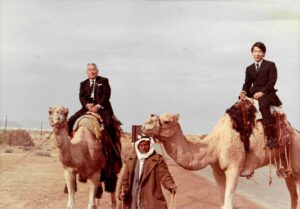 have the visas.”
have the visas.”
Chiune Sugihara died at a hospital in Kamakura, on July 31, 1986. Despite the publicity given him in Israel and other nations, Sugihara remained virtually unknown in his home country. I’m sure they didn’t consider him anything more than a criminal. Only when a large Jewish delegation from around the world, including the Israeli ambassador to Japan, attended his funeral, did his neighbors find out what he had done. His subsequent considerable posthumous acclaim contrasts with the obscurity in which he lived following the loss of his diplomatic career.

 Everyone who is old enough to remember the terrorist attacks of September 11, 2001, remembers where they were when they heard about the attacks, and when we think about the attacks, we are still saddened for the 2977 people who lost their lives, and their families, who have had to go on without them. Every time a patriot thinks about 9/11, our hearts ache for those who were lost…whose lives were cut short, and their potential left unfulfilled. What I have also seen is that those who hate this nation, have said that we need to move on and get over it, but that is not possible for those of us who love this nation, those who have lost loved ones, and those who pray for those who have lost loved ones.
Everyone who is old enough to remember the terrorist attacks of September 11, 2001, remembers where they were when they heard about the attacks, and when we think about the attacks, we are still saddened for the 2977 people who lost their lives, and their families, who have had to go on without them. Every time a patriot thinks about 9/11, our hearts ache for those who were lost…whose lives were cut short, and their potential left unfulfilled. What I have also seen is that those who hate this nation, have said that we need to move on and get over it, but that is not possible for those of us who love this nation, those who have lost loved ones, and those who pray for those who have lost loved ones.
When the attacks of 9/11 took place, the American people promised that were would never forget, and many people have not forgotten, but there are those who didn’t keep that promise. They began talking about how we should all just “get along” and “coexist.” I know that there are those who will say I am being hateful, but they are wrong. It is not for me to judge those who did these terrible acts. God will be their judge. Nevertheless, it is my job to remember and be watchful. If we are not watchful, we open the doors to another attack in our nation. If we think it could never happen again, we open the doors for it to absolutely happen again. We cannot stick our heads in the sand in such a reckless fashion. Evil exists out there, and if we are not watchful, evil gets a foothold. It is up to us to stop evil from getting that foothold.

When we were complacent in 2001, evil was able to get a foothold. While the airline industry had not had a hijacking in a long time, we were all told always to cooperate with the hijackers. On 9/11 that advise would prove disastrous in three of the four hijacked airplanes. Because everyone cooperated, we watched three planes hit their intended targets. In the fourth hijacked plane, because people called their families, they knew that the hijackers were not going to take them to some foreign country, but rather that they had become a flying bomb. In a selfless act of heroism, they passengers decided to put a stop to the attack their plane was intended to inflict. They didn’t know what building their plane was headed for, but they suspected it was…the US Capitol. And they knew that they had to stop it, because no one else would. Shooting down a hijacked plane was unheard of, and so no order to shoot it down ever came. So in a selfless, heroic act, the passengers of Flight 93 attempted to take over the cockpit, knowing that it was very likely that they would have to crash the plane…which they did.
Unfortunately, we have once again forgotten. We have once again become complacent. We have once again 
 begun to blindly take orders from those who do not have our best interests at heart. And…we have put our nation in a very precarious position…again!!! How could we have forgotten? Yes, we hold memorial ceremonies every year, but when things in our nation don’t seem right, we sit back and say that the government knows best…but do they? Really…do they?
begun to blindly take orders from those who do not have our best interests at heart. And…we have put our nation in a very precarious position…again!!! How could we have forgotten? Yes, we hold memorial ceremonies every year, but when things in our nation don’t seem right, we sit back and say that the government knows best…but do they? Really…do they?
 When you hear about a giant rabbit attack, what is your first thought? Maybe, that the person telling you they were attacked by a giant rabbit, was on some hallucinogenic drug, of the Alice in Wonderland variety, right? Well, I can’t say whether this story involved a hallucinogenic drug or not, but I really doubt it…mostly because in involves a former American president. I’m not saying an American president could never use drugs, but I had never heard that former President Jimmy Carter had used them, at least not while he was in the White House.
When you hear about a giant rabbit attack, what is your first thought? Maybe, that the person telling you they were attacked by a giant rabbit, was on some hallucinogenic drug, of the Alice in Wonderland variety, right? Well, I can’t say whether this story involved a hallucinogenic drug or not, but I really doubt it…mostly because in involves a former American president. I’m not saying an American president could never use drugs, but I had never heard that former President Jimmy Carter had used them, at least not while he was in the White House.
Nevertheless, as the story goes, in 1979, in the middle of his presidency, former President Jimmy Carter went fishing by himself in a swamp…a story that is a little bit  odd, because presidents don’t go anywhere without the Secret Service agents assigned to them. While he was in his boat in the swamp, a “giant” swamp rabbit swam directly toward him, seemingly intent on killing him. The swamp rabbit, also called the cane-cutter, is a large cottontail rabbit found in the swamps and wetlands of the southern United States. The species has a strong preference for wet areas, and it will take to the water and swim. Apparently these rabbits aren’t afraid of anything, especially a mild-mannered president fishing in a boat. Former President Carter found himself in a bit of a fight for his life…another reason to take those Secret Service agents with him. The former president had to scare the rabbit away by waving an ore at it. After the incident, he returned to the White House with quite a terrifying story to tell, but it was not really well received…yet another reason to take the Secret Service agents with him…witnesses.
odd, because presidents don’t go anywhere without the Secret Service agents assigned to them. While he was in his boat in the swamp, a “giant” swamp rabbit swam directly toward him, seemingly intent on killing him. The swamp rabbit, also called the cane-cutter, is a large cottontail rabbit found in the swamps and wetlands of the southern United States. The species has a strong preference for wet areas, and it will take to the water and swim. Apparently these rabbits aren’t afraid of anything, especially a mild-mannered president fishing in a boat. Former President Carter found himself in a bit of a fight for his life…another reason to take those Secret Service agents with him. The former president had to scare the rabbit away by waving an ore at it. After the incident, he returned to the White House with quite a terrifying story to tell, but it was not really well received…yet another reason to take the Secret Service agents with him…witnesses.

The media found the whole thing amusing. They began calling the event a “killer rabbit attack” and everyone was talking about how a rodent tried to kill the president. While people today might not recall the event, it is widely considered the most memorable event of Jimmy Carter’s presidency…which was another slap in the face for him. A president wants to be remembered for all the great things he has done for the country, not being attacked by a giant swamp rabbit. Presidents want to be remembered for boosting the economy or standing up to Soviet dictators, but instead, former President Carter was remembered for nearly getting taken out by a bunny rabbit.<
 The 19th Amendment states that the right to vote “shall not be denied or abridged by the United States or by any State on account of sex.” In theory, this language guaranteed that all women in the United States could not be prevented from voting because of their gender. Of course, these days, no one really gives that a second thought, because…well, of course, women can vote. Who dared to think otherwise? Nevertheless, women were not always given the right to vote. In fact, for many years, men thought that politics was something that women could not possible begin to understand, and that it was a subject that was simply too harsh for the fragile female mind. Hahahaha!! We can laugh at such a thought now, because it is completely absurd, but that is what everyone thought back then…before the 19th Amendment was passed, following a fierce battle between the women suffragists and the men who ruled the nation.
The 19th Amendment states that the right to vote “shall not be denied or abridged by the United States or by any State on account of sex.” In theory, this language guaranteed that all women in the United States could not be prevented from voting because of their gender. Of course, these days, no one really gives that a second thought, because…well, of course, women can vote. Who dared to think otherwise? Nevertheless, women were not always given the right to vote. In fact, for many years, men thought that politics was something that women could not possible begin to understand, and that it was a subject that was simply too harsh for the fragile female mind. Hahahaha!! We can laugh at such a thought now, because it is completely absurd, but that is what everyone thought back then…before the 19th Amendment was passed, following a fierce battle between the women suffragists and the men who ruled the nation.
Nevertheless, in the midst of that fierce battle for the right to vote, an odd event took place in the form of the election of a US Congress member, Jeanette Rankin somehow being elected to Congress!! She was elected to 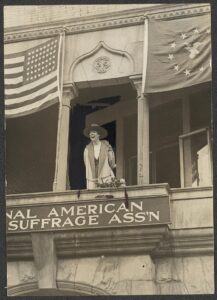 the US House of Representatives as a Republican from Montana in 1916, and again in 1940. Rankin was a woman, so how could this have possibly happened. She couldn’t even vote, and yet she won the election. That’s crazy. If her “fragile” mind could not be expected to understand how to vote for the office, how would she ever be able to function in the office. I mean, after all, she would be dealing with the same politics that her fellow members of congress had deemed her too fragile to understand. In fact, Jeanette Rankin would not be able to vote in an election until August 18, 1820. Her term in office ran from March 4, 1917 to March 3, 1919…during which time she was the only woman in the United States who could vote. Rankin would serve again from January 3, 1941 to January 3, 1943. Oddly, each of Rankin’s Congressional terms coincided with initiation of US military intervention in the two World Wars. A lifelong pacifist, she was one of 50 House members who opposed the declaration of war on Germany in 1917. In 1941, she was the only member of Congress to vote against the declaration of war on Japan following the attack on Pearl Harbor.
the US House of Representatives as a Republican from Montana in 1916, and again in 1940. Rankin was a woman, so how could this have possibly happened. She couldn’t even vote, and yet she won the election. That’s crazy. If her “fragile” mind could not be expected to understand how to vote for the office, how would she ever be able to function in the office. I mean, after all, she would be dealing with the same politics that her fellow members of congress had deemed her too fragile to understand. In fact, Jeanette Rankin would not be able to vote in an election until August 18, 1820. Her term in office ran from March 4, 1917 to March 3, 1919…during which time she was the only woman in the United States who could vote. Rankin would serve again from January 3, 1941 to January 3, 1943. Oddly, each of Rankin’s Congressional terms coincided with initiation of US military intervention in the two World Wars. A lifelong pacifist, she was one of 50 House members who opposed the declaration of war on Germany in 1917. In 1941, she was the only member of Congress to vote against the declaration of war on Japan following the attack on Pearl Harbor.
Jeanette Rankin was born on June 11, 1880, near Missoula in Montana Territory. Montana would not become a 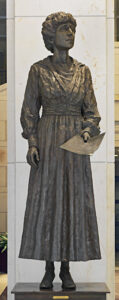 state for another nine years. Her parents were, schoolteacher Olive (née Pickering) and Scottish-Canadian immigrant John Rankin, a wealthy mill owner. She was the eldest of seven children, including five sisters (one of whom died in childhood), and a brother, Wellington, who became Montana’s attorney general, and later a Montana Supreme Court justice. One of her sisters, Edna Rankin McKinnon, became the first Montana-born woman to pass the bar exam in Montana and was an early social activist for access to birth control. With all that, it’s little wonder that she became a congresswoman. Apparently, politics ran in the family, and was likely an often-debated subject in the family home.
state for another nine years. Her parents were, schoolteacher Olive (née Pickering) and Scottish-Canadian immigrant John Rankin, a wealthy mill owner. She was the eldest of seven children, including five sisters (one of whom died in childhood), and a brother, Wellington, who became Montana’s attorney general, and later a Montana Supreme Court justice. One of her sisters, Edna Rankin McKinnon, became the first Montana-born woman to pass the bar exam in Montana and was an early social activist for access to birth control. With all that, it’s little wonder that she became a congresswoman. Apparently, politics ran in the family, and was likely an often-debated subject in the family home.
While Rankin was in her first term in office, it would seem to me that she must have felt a very strong sense of responsibility, because she was at that time the voice of all women…at least as it applied to government and politics. I can’t say that I would have agreed with all of her votes in office, especially where it applied to the two world wars, which I feel the United States needed to be involved in. Perhaps it is that aspect of being in office that the men didn’t think women were very well equipped to handle…war being such an emotional issue and all. I still think that there are many women who might struggle with the idea of sending our men into war, but then there are men who feel the same way, so I guess it is just a matter of where people stand concerning war. To date, Rankin remains the only woman ever elected to Congress from Montana.

 The other day, while in the Black Hills, I was spending time in one of my favorite pastimes…people watching. Keystone, South Dakota is an interesting mix of people, and somehow everyone gets along and mingles with ease. There is no animosity in Keystone. Everyone is in a relaxed, party mood and even when they are waiting in line to order food, and the line is really long, and things are taking some time, nobody gets upset. They are kind to each other and they are patient. I watched people from all walks of life. There were bikers standing next to what appeared to me to be a doctor and his family, and there were smiles all around. People helped those who needed help, opened doors for each other; and by the way, color made no difference. In the year following a year of riots, unrest, racism, and rudeness, this was Heaven.
The other day, while in the Black Hills, I was spending time in one of my favorite pastimes…people watching. Keystone, South Dakota is an interesting mix of people, and somehow everyone gets along and mingles with ease. There is no animosity in Keystone. Everyone is in a relaxed, party mood and even when they are waiting in line to order food, and the line is really long, and things are taking some time, nobody gets upset. They are kind to each other and they are patient. I watched people from all walks of life. There were bikers standing next to what appeared to me to be a doctor and his family, and there were smiles all around. People helped those who needed help, opened doors for each other; and by the way, color made no difference. In the year following a year of riots, unrest, racism, and rudeness, this was Heaven.
Of course, we were in South Dakota…a Republican state that did not close down for Covid. I’m not going to get too deeply into politics here, but it is impossible not to notice the difference in the states. I was in Keystone when President Trump was at Rushmore, and there were protests, but no real violence, no riots, and no vandalism. People were just different there…more polite, more civil, more caring. Even in the midst of a protest, when people were calling out their own views, there was no violence. That means something. It means that people can disagree without being hateful. It also means that certain things were not going to be tolerated, and those who would act out should know they would be arrested. Of course, the police were everywhere, and having a police presence is crucial to keeping order. I am aware that there are good cops and bad cops, but in Keystone, it seemed that the police officers were good and caring, because they wanted the honor that went with being good cops.
There are also good people and bad people, and there are those who are paid to be evil. And those are the worst kind of all. People talk about the naivete of the rural people of our country, but I think they are some of 
 the best people there are. Those good old fashioned values, caring about your neighbors, helping others, and not looking at the color of someone’s skin, those are the kind of people I see in rural America. I wouldn’t want to live in a big city, because I think you lose a lot of that loving, caring lifestyle. That is what we need to work toward getting back in this country…a more caring lifestyle.
the best people there are. Those good old fashioned values, caring about your neighbors, helping others, and not looking at the color of someone’s skin, those are the kind of people I see in rural America. I wouldn’t want to live in a big city, because I think you lose a lot of that loving, caring lifestyle. That is what we need to work toward getting back in this country…a more caring lifestyle.

